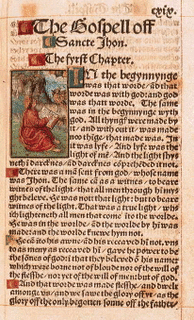First, I'm very slowly beginning to read the early twentieth century French philosopher Henri Bergson (1859-1941). I'm digitizing an introductory monograph of his for inclusion in Project Gutenberg. Bergson's works were published in French just before the turn of the century and, up until WWI, he was a world-star of academia. A 1913 announcement that Bergson would be lecturing caused the New York's Times Square's first traffic jam. Indeed, Bergson is experiencing a renaissance in phenomenology circles, and especially among film theorists such as Gilles Deleuze. French thinkers as Merleau-Ponty, Sartre, and Lévinas acknowledge his influence on their thought. There is something in him about the image and its permanence through change. I don't know enough to even know why I want to know. I'm just following the tip of my nose and seeing where it all goes.
Martin Heidegger, on the other hand, is beautiful! He is to the twentieth century what Kant and Hegel are to the nineteenth. I'm teasing apart the eleventh edition of his 1929 address "Was ist Metaphysik?" In eight or nine pages, he overthrows the Enlightenment projects "certainty" and announces the hermeneutical nature of theology up to the present day. Marvelous! In that one essay--as fundamental as Renee Descartes's Meditations on First Philosophy--Heidegger cracks the solid wall of modernism and opens a space for the suspicion-of-supicion called postmodernism. It is really exciting, but slow going. I only have a few minutes a day to devote to the few pages a day I can cover. And it is not uncommon to review.
Additionally I'm discovering what I believe could be the beginning of my first pursued publication/article. The theme is the nakedness of Christ. I believe that research will show that Christ was crucified naked, yet the Gospels do not directly mention this, nor does any treatment in art or film of which I am aware. Being the second Adam, there is something here, a parallel to the innocent nudity of our first parents. And, note that he appears clothed after the resurrection. Paul, too, talks about our present nakedness and a longing to be clothed. Nakedness in the OT is always bad, connected to adultery (idolatry), but it seems that there is a change in that--a restoration of it. And this theme can easily branch out into discussions of the human gaze, our own embodiedness (and shame), even philosophically there is a motive of conceal/reveal; known/unknown; there is something about the difference between voyeurism and the gaze of love. I mentioned to L/ the other day, thinking about this, that Jesus's nakedness (for I am assuming at this point, albeit prematurely, that he was naked on the cross) was the nakedness of a groom who presents his body lovingly to his bride, whereas the world sees through the eyes of humiliation and rejection. It quakes with fear at the exposure of its own nakedness. [A later addition: this would also figure into media studies where people reveal and conceal themselves through media.]
I'm also playing with ideas about a unique method for writing theology modeled on the improvisational community-making methods of jazz. As in music composition, I would like to propose a fundamental motive and build my paper out of its development just as if it were a musical composition. I want to think of theology from the perspective of the liberal arts, rather than syllogistically like a math problem or taking a cue from Quintillian's rhetoric. I want it to welcome, receive, and serve as a vehicle for the opening up and uncovering of human being-ness (there's the Heidegger.) We should read a theological text as much like a work of art or a musical score as a "logical argument." People are not argued into the Kingdom as much as they are drawn as the Spirit opens their eyes to the beauty of the gospel. In that case, the choice is obvious. It is the choice for oneself as one was created to be, and the giving up of fantasies about personal divinity.
Anyway, as soon as I'm done with this review, I'm going to get back into Greek during the day and devote next Tuesday to beginning the Biblical/exegetical historical-critical research on the nakedness of Christ. Since the gospels do not say (they turn away, really, viewing the crucifixion with their eyes shut to a large extent), I have to be able to build a pretty solid case if I'm going to rest an entire argument on the nakedness of Jesus. As to why this theme comes to me--this theme of the nakedness of Christ--I have no idea. It just bubbled up two or three weeks ago.
See, my heart says that I'm tired of reading secondary sources. I need to stop "throat clearing" as Dr. Lim calls it, and pick up my own pen, whether I'm totally ready or not. I will even go so far as to say I'm "called" to this, like a missionary is called overseas. It burns away in my mind and my heart night and day, and even obstructs my reading: "Why are you reading this? This is not your work. Why are you following this argument? It is not your argument. It is time, time to find out who you are. What do you have to say for yourself? It is time: do it now, before you become forever lost to yourself and become a parrot and a servant of the ideas that others are having. You will be forever reading, forever questioning, but arriving nowhere. You will be growing, but to where? From where? What is your offering? What do you bring? Do you even have your own questions any longer? Do it now."

